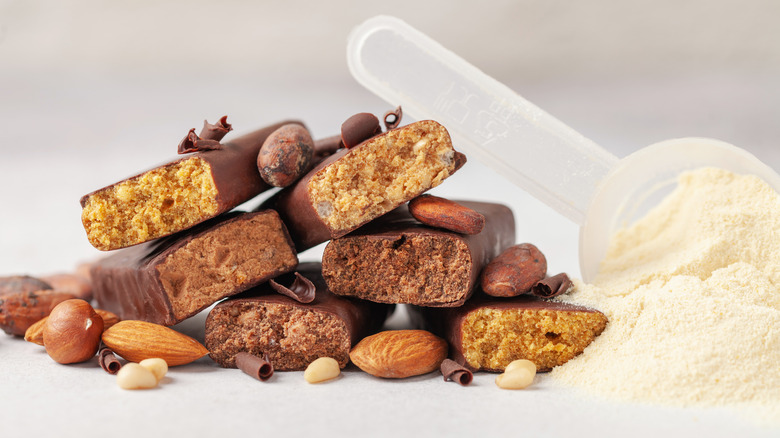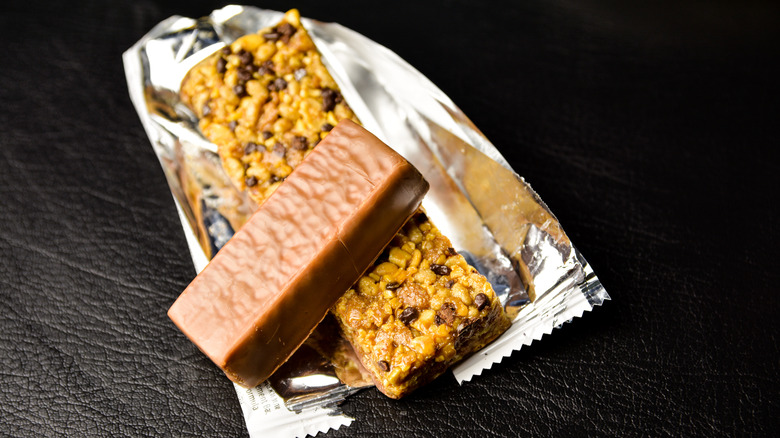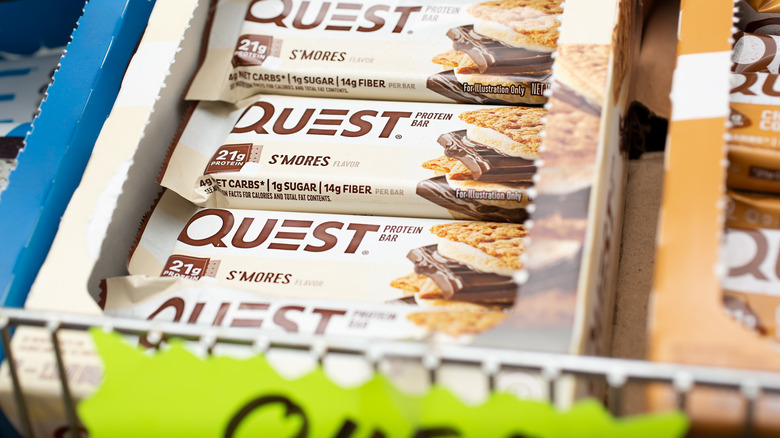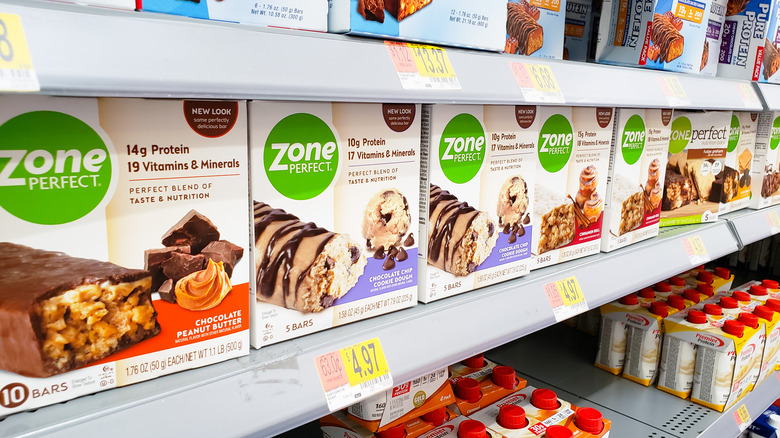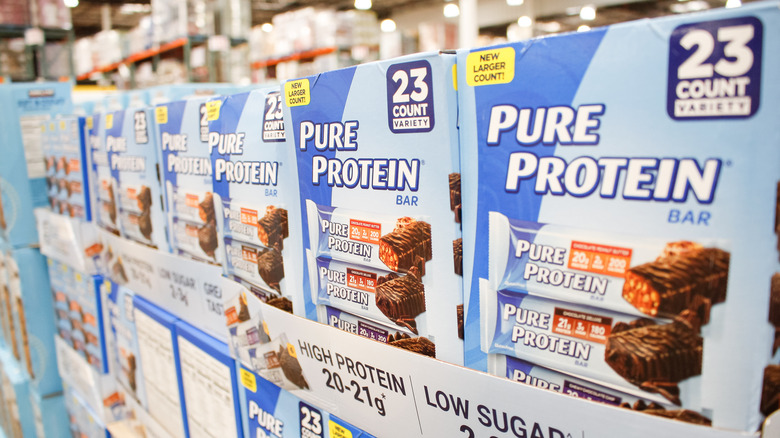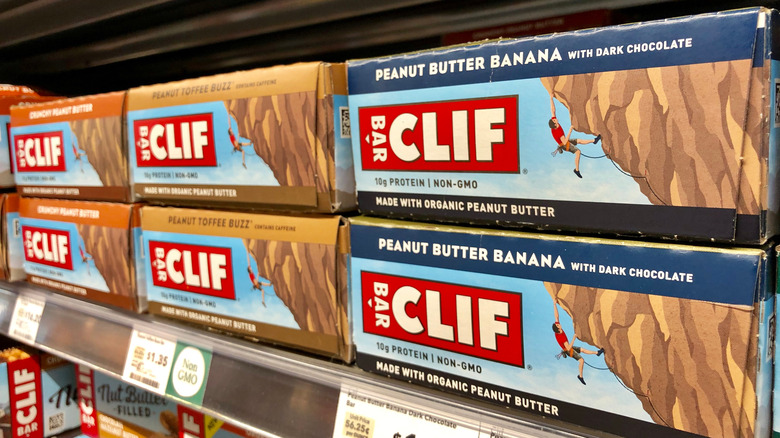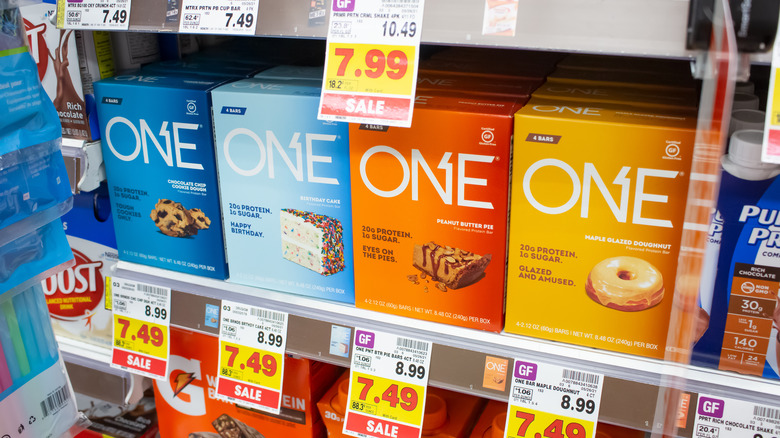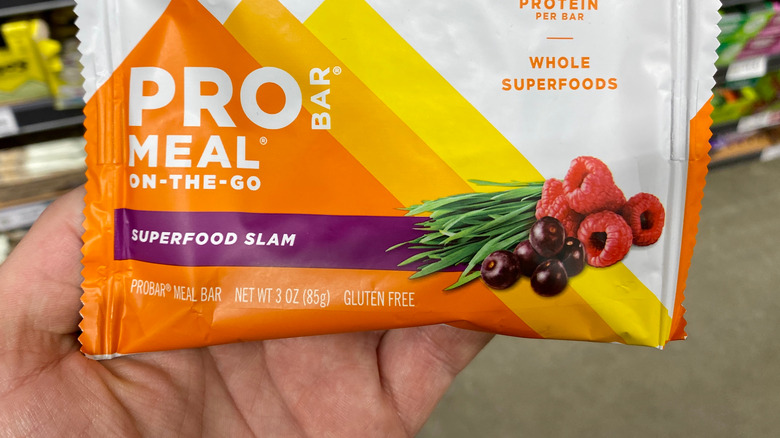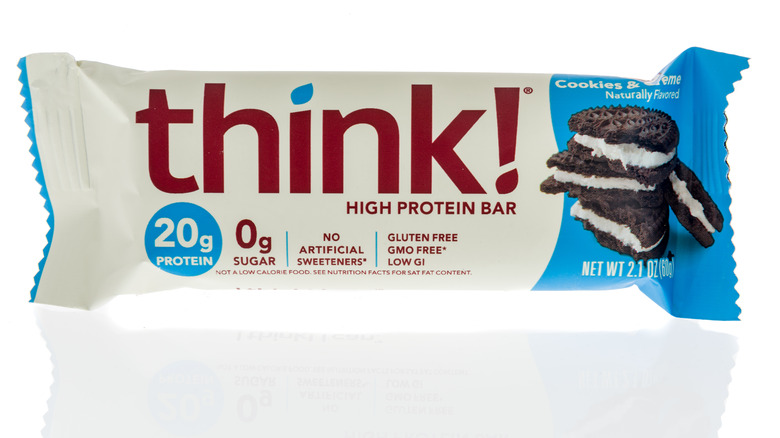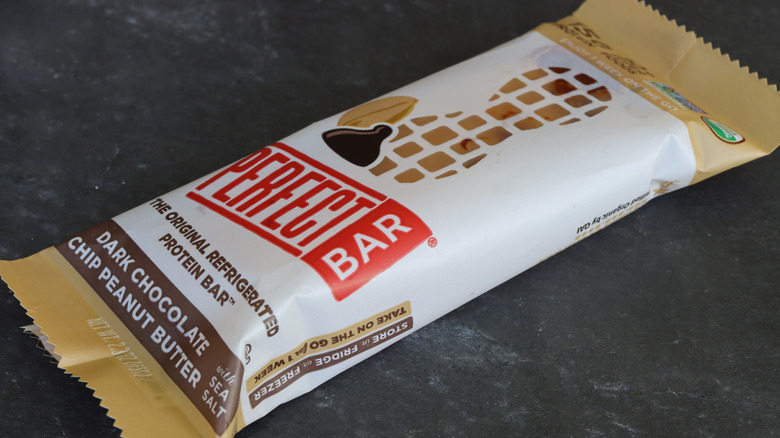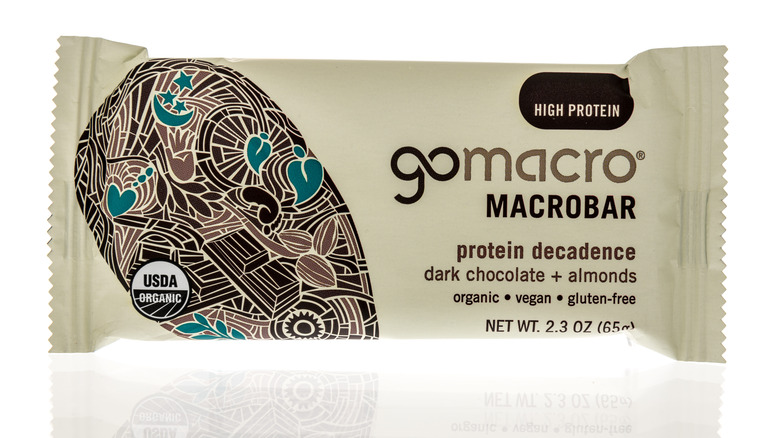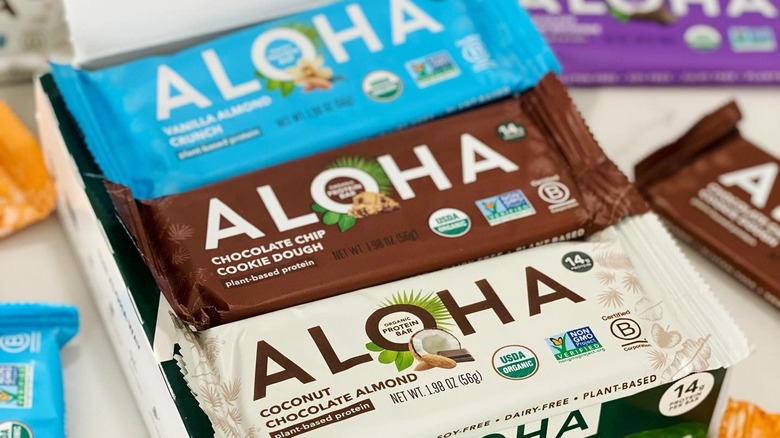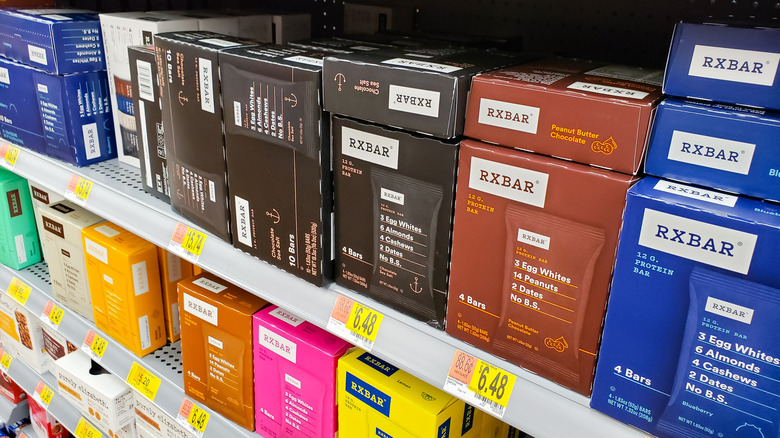Popular Protein Bar Brands, Ranked Worst To Best
Most of us can agree that there are times when we need a pick-me-up to get us through a busy afternoon, to tide us over between meals, or to make us feel our strongest after a really intense workout. There are even times when we know we might not be able to get breakfast or lunch, so we need something really substantial to take care of our bodies. Is it any wonder that protein bars have become so popular? They're convenient to toss into your briefcase, gym bag, or purse, and you can eat them on the go to get that boost of nutrition you might miss out on otherwise (via Live Science).
The only problem is that not all protein bars are created equal. And with all the marketing surrounding them, it can be tough to determine which ones are the real deal and which ones are glorified candy bars being touted as healthy. So, if you're somebody who relies on protein bars to get through your day, but you don't know how you should be making your selection, here's some food for thought.
How to assess a protein bar
Here's the tough part about ranking a protein bar or just dubbing it the best or the worst: Your mileage is going to vary. Everyone is a little bit different, and your needs are going to be a little bit different. Therefore, the right protein bar for somebody else might not necessarily be the best protein bar for you. That said, there are some general guidelines for adjudicating a protein bar. According to Livestrong, you can start by assessing the ingredient list and looking for bars that are made primarily of whole foods (fruit, egg whites, nuts, etc.) instead of ingredients that you don't recognize or lots of added sugars and additives. You also want to look for protein bars that offer plenty of protein and fiber, as these will help keep you satisfied until your next meal. A protein bar with at least 10 grams of protein and at least 3 grams of fiber is generally considered satisfactory.
Ingredients and nutrients you should pay attention to
If you want to get specific about the ingredients and nutrients that make up a "good" or "bad" protein bar, consider this: Your bar might get its protein from either a whole food source (such as nut butters or egg whites) or a concentrated/isolated source (such as whey protein). Either source of protein is fine, according to Eat This, Not That!, which encourages choosing a bar with only 7-12 grams of protein if you just want a nutrient-dense snack that will tide you over, and only going up to 15-20 grams of protein if you are seriously trying to pack on muscle.
And while fiber is good, this is something you want to make sure you're getting from whole sources, especially if you're an athlete. Eat This, Not That! explains that synthetic fiber sources, such as chicory root, can upset your stomach in the middle of intense exercise.
Finally, watch out for added sugar (though natural sweeteners are better than sugar alcohols, which should be avoided) and don't go over 13 grams of sugar. Protein bars that are sweetened with whole fruit are great, as whole fruit doesn't constitute added sugar the way fruit juice or fruit concentrate does.
The when and how of healthy protein bar consumption
If you want to get the most out of your protein bars, you want to make sure you're being smart not just about what's in them, but about when you eat them, and how many you eat. Even the best protein bar will be to your detriment if you eat too many of them or if you aren't doing sufficient physical activity. Gear Hungry explains that protein bars are intended to supplement a healthy diet — one that is full of high-quality whole foods and provides plenty of protein (if you're trying to build muscle, that would mean about 1-1.7 grams of protein per kilogram of bodyweight, or 0.5-0.8 grams per pound).
You can eat a protein bar either before a workout to fuel yourself or after a workout to aid in recovery. You can eat a protein bar every day, and as long as you're not overeating them, you can probably count on protein bars to help you maintain a healthy weight because of protein's vital role in satiety (that is, feeling full after and between meals) as well as building muscle mass.
Quest
Quest bars are a great example of why just looking at the nutrients list alone won't give you the full perspective on a protein bar. If you were to consider Quest bars based on factors like protein content, fiber content, and sugar content, you might actually think that these are the perfect answer you've been looking for. Most of them have a ton of protein and fiber with very little (or sometimes even no) sugar content. Livestrong points out that the birthday cake flavor Quest bar has 21 grams of protein and 14 grams of fiber, all with no added sugar and less than a gram of total sugar. What's not to celebrate about that kind of birthday cake, right?
But as Livestrong notes, Quest bars aren't made from whole foods. Even worse, they are sweetened with sugar alcohols, which could upset your stomach. Also, if you're getting used to ultra-sweet foods like Quest bars, you might start craving other sweet foods that could be higher in calories.
But it's not just the sugar alcohols that could be upsetting your stomach. Spoon University explains that the fiber additive in Quest bars, known as Isomalto-Oligosaccharides (or IMO for short), along with the whey protein, could cause digestive distress.
Zone Perfect
When you're packing a snack called Zone Perfect, you could be forgiven for thinking that it's the perfect option for recovery when you're in the exercise zone. However, that might not actually be the case. As Livestrong explains, Zone Perfect bars do have plenty of protein. And they have a wide range of vitamins and minerals that your body needs for proper function. But they also have plenty of drawbacks as well, primarily the fact that they are highly processed. Eat This, Not That! even includes Zone Perfect bars among its worst protein bars list because of ingredients like corn syrup, palm oil, sugar, and soy. Even if they deliver on the protein you need, you'll still be taking in a lot of added sugar and sodium that you really don't want. Even the low-sugar versions on the market aren't a great option, as Livestrong points out, because they are made with sugar alcohols that are bound to cause digestive discomfort. Unless you're judging them on protein alone, these bars are anything but perfect.
Pure Protein
Pure Protein bars have become a popular option for people who are doing ketogenic diets, according to Human Food Bar; however, this trend is slightly misleading because none of the varieties of Pure Protein bars actually has enough fat content to lend itself to keto. Instead, most of the calories in Pure Protein — as their name would suggest — are coming from protein.
In some ways, this sounds like it could be ideal. Protein is good, correct? And if people are using them for keto, they're clearly very low in sugar, right? But Eat This, Not That! explains that even though Pure Protein bars could be successful in helping you manage your weight, they really wouldn't be classified as healthy. That's because they are full of artificial sweeteners, and some of the bars have only a gram of fiber in them. And their fat content really isn't coming from healthy sources of dietary fat — instead, much of the fat is coming from ingredients like palm oil and dairy, which are sources of saturated fat.
Clif
Pay attention to the way Clif bars are marketed. They usually have a picture of an athlete on the wrapper, indicating that these are bars intended for physically active consumers. This is important, as Medical News Today explains, because Clif bars are high in carbohydrates, and they could lead to weight gain if you're eating them but not doing a lot of exercise. In fact, much of those carbohydrates come from Clif's sugar content in the form of brown rice syrup, so if you're somebody who is watching your sugar intake, Clif could be far from the best option.
That said, Clif is a good source of protein — the Crunchy Peanut Butter variety, for example, has 20% of the 56 grams of protein a man needs every day. And because this protein comes from soy, it could be efficient for building muscle and helping you maintain a healthy weight. However, if you're allergic to soy, it's best to avoid Clif bars.
ONE
By now, you're probably noticing a pattern with protein bars: They have a lot of protein to aid your muscle recovery after a workout and keep you feeling full between meals, but they also can have plenty of problems, such as a sugar alcohols and processed ingredients. ONE bars fall into a similar category. Although they deliver 20 grams of protein, you're also consuming 9 grams of fat and 115 milligrams of sodium; they have a moderate 3 grams of fiber and only 1 gram of sugar, but they're also sweetened with 6 grams of sugar alcohol (via Fit Healthy Momma).
So if you're looking for something that's minimally processed and made from whole foods, you'll have to pass on the ONE bars and keep looking. But if your priority is just to boost your protein intake, then Fit Healthy Momma argues that ONE bars are not a bad choice. As a bonus, they taste great and don't have an artificial aftertaste like the one you get from many bars made with sugar alcohols.
ProBar
ProBars don't have quite as much protein as other options on the market, but don't let that fool you — these are still a great option, depending on your needs. The Washingtonian explains that ProBars serve as a good meal replacement instead of a simple protein boost. They have up to 400 calories with a lot of carbohydrates to help you recover from physical activity. For people who are watching their calories closely in an effort to lose weight, the ProBar might be a little too energy dense. But if you're an athlete who has been doing a lot of physical activity and doesn't have immediate access to a square meal (such as a hiker who is out on the trail all day), then a ProBar could meet your needs. Go Dairy Free praises it for being made with whole foods like fruit, nuts, oats, and seeds, and points out that there are bunch of varieties of ProBars available.
Think
Think bars are a rebranded version of what was originally known as Think Thin, according to MultiSport Mojo. But even with a different name, these bars still pack a punch of protein without being too high in calories or sugar. The amount of protein varies, and some flavors of the bar have up to 20 grams of high-quality protein that will aid your workout recovery and keep you feeling full. And while most of them do have less than 5 grams of sugar and no artificial sweeteners, they do have the sugar alcohols that have been considered a con for so many other protein bars out there. Even so, Multisport Mojo praises Think bars for being lower in calories and for tasting great, a serious bonus when the taste factor of protein bars can be hit or miss. Additionally, there's a gluten-free vegan version of the Think bar that still offers 13 grams of protein. The only drawback that Multisport Mojo cites is that they're so good, you might not want to stop at eating just one.
Perfect Bar
Perfection is a seriously high standard to meet. But if you're looking for a bar made from real, whole, minimally processed ingredients, then the Perfect Bar might be your go-to choice. Real Good Eats notes that you're likely to recognize most of the ingredients listed on the label, with the protein content derived from a variety sources that aren't ultra-processed, including things like peanut butter, rice protein, skim milk powder, and dried eggs. And there's no shortage of that key nutrient, with a peanut butter bar supplying 17 grams of protein. Additionally, the bar has a lot of fat, but Real Good Eats sees this as a positive, as the fats are the healthy kind that will keep you feeling full. Men's Health points out that the caloric density of a Perfect Bar means it's better as a meal replacement (especially for anyone trying to pack on muscle mass) instead of as a simple snack.
GoMacro
Not all protein is created equal, and a lot of people assume that plant-based forms of protein are of a lesser quality, thus making it difficult to find a great protein bar for vegans. But Go Macro might be the best option out there for herbivores, as Bustle explains. Not only are GoMacro bars made primarily with organic ingredients, but they also use a combination of plant-based protein sources — namely, sprouted brown rice protein and pea protein. These plant-based protein sources are easier for your body to break down and use. The only downside, as I Am Going Vegan points out, is their sugar content. GoMacro bars have a lot of sugar. And sure, it's great that they don't have any artificial sweeteners and they are sweetened with brown rice syrup instead of ultra-processed high fructose corn syrup, but sugar is still sugar. Because of this, you should be wary of using GoMacro bars to help you maintain a healthy weight and instead use GoMacro bars to help fuel an intense workout.
Aloha Bars
There's a lot about Aloha bars that are going to make you want to say "aloha" to them. For starters, as Human Food Bar points out, they are high in protein while being low in sugar — most flavors have about 14 grams of protein with only 3-5 grams of sugar. And Aloha bars don't have any sugar alcohols or artificial ingredients. They are high in carbohydrates that can help athletes fuel their performance during a workout or recovery afterward, and are also a good fit for people with dietary restrictions, as they are vegan, gluten free, and soy free (unfortunately, there is not currently a flavor that's nut free). As Healthline explains, their plant-based protein is a mix of protein from pumpkin seeds and brown rice.
One downside? Human Food Bar says their taste and texture could be a hit or a miss. Some flavors are good, but others aren't.
RX Bar
There's a good reason Eat This, Not That! puts RX Bars at the top of its list of best protein bars: They're made with whole foods, including dates for sweetness and egg whites for high-quality protein. They also include nuts and natural flavors. Depending on the flavor you choose, you could be getting up to 12 grams of protein and 5 grams of fiber per bar. While they do have sugar, that's from the dates, not from any added sugar.
A dietitian's review from Read Good Eats notes that RX bars could be a quality choice because they are so minimally processed. There's not a ton of sweetness like you would get with a bar sweetened by added sugar or sugar alcohols, and you'll enjoy a hearty chewiness from the fruit and nuts. Additionally, Real Good Eats notes that the egg whites are nicely blended into the bar and not something you will be able to taste.


